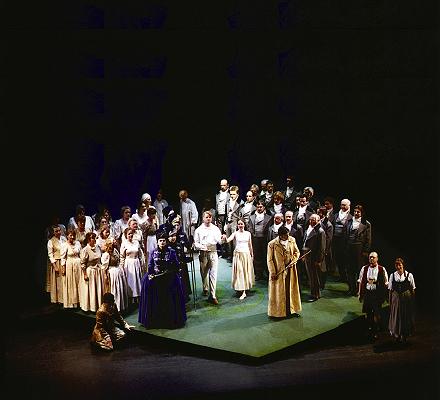|
<< -- 4 -- Tess Crebbin MOZART AND LEDERHOSEN

In this Bavarian version of the opera, with its abbreviated text and Bavarian dialect adaptations, Von Morgen says for him the emphasis is on the sensual level. 'The focus here is on Papageno, who makes us laugh and takes us into his wonderful funny and simplified life. It is all about eating, drinking and finding a mate. This is the kind of attitude that you still find a lot in the Bavarian countryside: good-hearted people who find pleasure in the simple things of life like a chilled beer, a nice rich meal of sausages, and a warm, caring mate.'
Speaking of good-hearted, this aspect also comes out in the Bavarian-style Queen of the Night of Slawitschek. For Von Morgan, '... the Queen of the Night sings some of the most challenging coloraturas ever written and it must be stated that Slawitscheck has a wonderful voice able to master these difficult musical problems. But there is also another aspect to her Queen of the Night that I feel is important: she is not evil per se. Often, the Queen of the Night is portrayed in a very cold manner. But in the Bavarian version, her rough shell hides her vulnerable insides. That is also very much an aspect of the Bavarian people: they can be rather rough when you first meet them but underneath all of that is a good and loyal heart.'
Slawitschek thinks that her character is a torn woman. 'She loves her daughter, she loses her daughter, and she suffers over it. She is a woman caught up in her own image as the dreadful fear-inducing queen, but when she complains about how difficult life is for her, you understand that she is not cold. So, to me, this part is not just about coloratura acrobatics. It is about bringing out the essential tragedy that makes up the Queen's life and so it requires a great amount of dramatic willingness to enter into the torn Night Queen who is very interesting in her own right, especially for all her inner conflicts, between good and evil, between hurting inside and struggling not to show it on the outside.'
Asked about how she feels about singing a Queen of the Night with such a distinct Bavarian touch, Slawitschek says: 'I am a Bavarian, after all, born and bred, so I welcome the chance to show some of my cultural heritage as a part the opera. What I really enjoy about working with Mr Kleeblatt is that he is so very innovative, putting on a production that not only provides a new angle for an opera that we think we have already seen in all possible versions, but also touches a different aspect within the public. It is something very special to be part of this.'

The Freies Landestheater Bayern production of 'Die Zauberflöte'. Photo © Anne Kirchbach
|
Maier-Kleeblatt's Bavarian Magic Flute has been so well received by audiences that demand is extremely high and performance bookings have been confirmed throughout 2005 in various theatres in Germany. This acclaimed opera production has also been recorded on CD, from a previous year's performance, and the CD and further information can be found on the theatre's website at www.flt-bayern.de.
|

